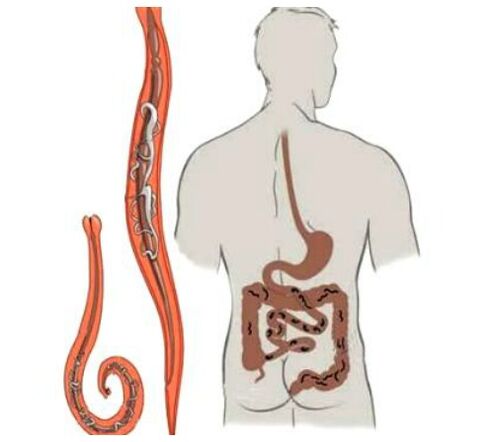The human body is an ideal environment for pathogenic microorganisms that can affect almost any organ or system, causing some diseases and disorders. Among such organisms, a special place is given to living parasites and consuming other cells and nutrients from the "owner" body. According to medical guidance, about 90% of different age category populations are parasitic carriers, treatment and studies involved in the medical part - parasitology. The term "parasite" means living organisms of various types that have the ability, settling in the human body, will be introduced in internal organ tissue, eating cells, juice or digested foods. Foreign organisms can penetrate any part of our body and live in it for a long time or throughout the life of a person. Some types of parasites in the human body do not cause special changes, but some can affect the well -being of the "host", and cause the development of some serious illnesses. In such cases, we talk about parasitic diseases that require immediate treatment. In medicine, parasites are called any pathogenic organisms that carry parasitic lifestyle in the human body. These include a variety of bacteria, viruses, fungi, and worms, simple, unicellular, arthropods, protozoal invasion and other species.
What is a parasitic disease?

Parasitic disease (aggression) is a large group of diseases caused by a variety of living pathogens that live and double in a person. There are about 300 types of parasites that can affect the human body. Parasitic disease can be caused by both pathogenic bacteria and parasite protozoa, arthropod, unicellular, and other parasites or viruses. The list of parasites in the human body is quite large, but regardless of its type, almost all releases toxins that destroy cellular structure, damage the internal organs, penetrate the flow of lymph, blood, which predict the body and interfere with the functioning of the internal organs and systems.
Basically, pathogenic organisms take the nutrients that a person receives along with food. Perhaps the behavior of "uninvited guests" explains that many people who lead the right lifestyle, monitor their health and food, do not get the desired results, because these "Darmists" take all the best, leaving someone just a small particle of useful substances. These creatures are so cunning that they often disguise themselves as other diseases, and one can walk around the doctor for years, but does not see positive results in treatment.
How does the parasite fall into the human body?
Foreign organisms can penetrate the human body in several ways, but most often infections occur through:
- Water or soil infected with worms.
- Food products that have not passed the desired processing: fried meat, fish, dirty vegetables, fruits, dairy products.
- Contact domestic or homeless animals.
- Insect bites.
- Do not comply with personal hygiene rules.
- Cover the relationship with the parasite carrier.
Many parasites living in the human body have no nervous, cardiovascular or respiratory system, but their reproductive organs can remove hundreds of thousands of cooked eggs into the environment. Eggs and parasites are very stable, they can be in the soil, water, food or personal items for a long time. For example, tape worm eggs can withstand 15 degrees and maintain their important activity for 9 months. Almost all parasites have protective mechanisms that cannot recognize and destroy the human body. That is why many parasitic diseases are difficult to diagnose. Pathogenic organisms can be in both intestines and lungs, blood, liver, joints, brain and even eyes. The place of localization of pathogenic organisms depends on other types and features, both people and parasites themselves.
The parasites that live in the body distinguish materials that have helped them live in a person for years. They have no digestive system, but, however, parasites only use useful substances that enter the human body, which allow them to live for years, while a person slowly loses his health, not suspecting the right reason.
Special organisms, to adapt to new conditions, use their "devices": sharp hooks, plates, hard hair, suction cups that always injure the mucous membranes of the organ. The parasite itself can have a few millimeters of up to a few meters, they also have the ability to secrete various toxins that poison the body as a whole, causing not only disruption in internal organs, but also suppresses immunity, destroys beneficial bacteria from the gastrointestinal tract, and resigns with their waste.
Signs and symptoms of parasites in the body

Parasites in the body - symptoms of their presence may not be present or resemble clinical manifestations of other diseases. For example, larvae in the lungs, causing symptoms of inflammation of the lungs, pinworms - appendicitis attacks, and parasites - biliary channel or pancreatitis attacks.
In addition, parasitic disease can be cold, sore throat, bronchitis and other diseases. You can suspect the presence of parasites in the human body according to the following symptoms:
- Disorders in the functioning of gastrointestinal tract: diarrhea, bloating, frequent constipation, angry intestinal syndrome
- Joint pain and muscle
- Allergic skin reaction
- Anemia: Many "cohabitants" eat blood, leading to the development of iron deficiency anemia
- Reduce or increase weight
- Violation in the work of the soul. Toxins that distinguish parasites have harmful effects on the nervous system, causing one to increase irritation, anxiety, frequent depression, panic attacks and other disorders
- Brooksism - Rattle Tooth in dreams
- Intestinal dysbiosis
- Violation in the work of the immune system. Many worms and parasites reduce the production of immunoglobulin A, which over time leads to a decline in immunity. A person is true -is a helpless prior to viral and contagious disease
- Respiratory tract inflammation process
- Oncological diseases. Length of parasites in the body causes a significant decrease in immunity and the deterioration of epithelial cells into cancer
In addition to the above symptoms, parasites often damage the liver, kidneys, and cardiovascular system, leading to violations in their work and the development of many diseases that are difficult to treat. It is important to note that all the signs of the parasite above in the human body are not the right confirmation of their presence. Only professional and high -quality diagnostics -quality will help determine the presence or absence of "uninvited guests".
How to recognize parasitic disease
It is difficult to diagnose the presence of helminths, especially after infection. To recently, the only way to identify "strangers" is duodenal sounds and stool analysis. The results of such studies make it possible to determine debris, larvae or parasitic eggs. However, such methods do not always provide reliable results. Currently, modern techniques are used to detect parasites, which allow you to identify almost any parasite.
- Calais Analysis (carried out at least 3 times)
- Immunoform Analysis (ELISA)
- ELISA test
- A method of serological research
- An ultrasound examination of the internal organs (ultrasound)
- Computed tomography
- PCR diagnostics offer parasitic analysis based on DNA analysis
Research results will allow not only to determine the presence of parasites in the body, but also to assess the condition of the internal organs, to identify other diseases or disorders.
The treatment of parasitic disease
The treatment of parasitic diseases depends on many factors: certain types, size, quantity, age, weight, weight and other features. Various types of drugs against parasites are provided in the pharmaceutical market, but not all drugs can overcome certain parasites. It is important to note that almost all parasites violate the function of the internal organs, so the patient should be prescribed comprehensive treatment, which will be aimed not only on the destruction of invasion, but also for damaged internal body recovery.
In addition to synthetic drugs, antibiotics, against worms, antiparasitic agents containing natural components are used in the treatment of parasites. Such funds have no contraindications and are well received by the human body.
Only a doctor should treat parasitic disease after the results of the research and determine the pathogenic organism. The course of treatment, dosage and drug name is individually prescribed for each patient. All antiparasitic drugs have a large number of contraindications and side effects, so you need a doctor's consultation before its use.
Important in the treatment of parasites is the use of drugs that restore the function of the gastrointestinal tract, liver, kidneys, help stimulate immunity, provide the body with vitamin preparation. No less than the main thing in the treatment of parasitic diseases is considered proper nutrition. Patients need to exclude their diet of meat and dairy products, as they are the ideal environment for parasitic spread. It also needs to fully exclude the use of sugar, sugar. Nutrition should be balanced, high -quality and useful to the body.
Prognosis after parasitic disease treatment is basically good, but in the case of large parasites is resolved in the body or significant damage to the internal organs is observed, it is difficult to predict the results after treatment.
Prevention of parasitic disease

You can protect yourself from parasite penetration, but only in cases if you adhere to simple rules. Prevention of parasites in one's body is located in:
- Compliance with personal hygiene rules
- Lack of contact with homeless animals
- Avoid children close to pets
- Play with children on the road to make sure he does not choose various items
- After playing in the sandbox, make sure you wash your hands
- While walking, do not eat on the road, only after their hands were washed
- Normal home cleaning
- Use only vegetables, fruits washed and treated
- Eat only meats are searched
- Drink only boiled water
- If any animals need the whole family at home once every 6 months to prevent parasitic disease.
Compliance with simple prevention rules will allow to protect against parasites, thus protecting yourself and your family from possible disorders in internal organs, which are often shown against the background of parasitic disease.
















































